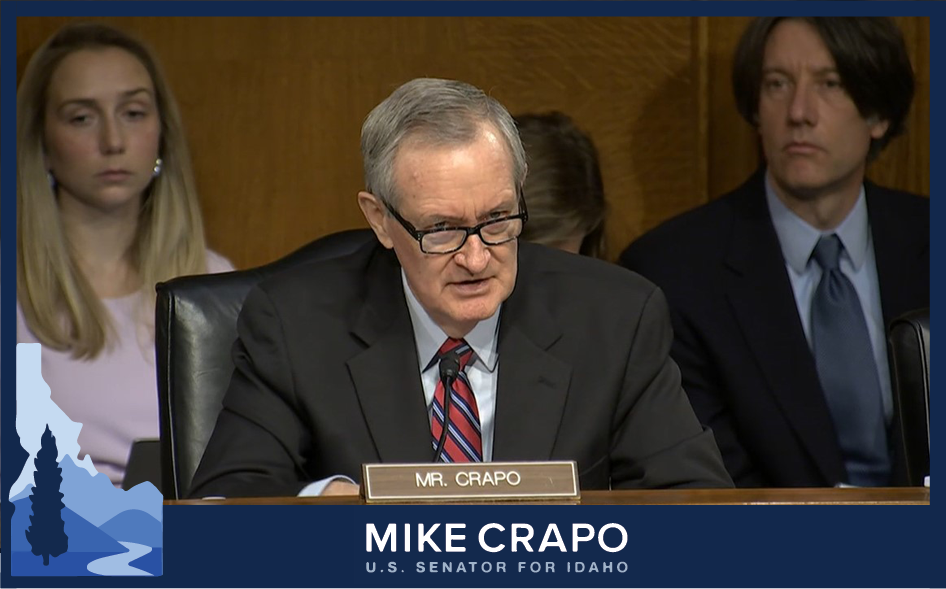Crapo: Nothing in S. 2155 Prevented Fed from Tailoring Risk
At hearing with banking regulators, Federal Reserve Vice Chair for Supervision confirms 2018 banking law did not prevent appropriate regulation
Washington, D.C.--At a U.S. Senate Committee on Banking, Housing, and Urban Affairs hearing examining recent bank failures, senior member and former chairman of the Committee Mike Crapo (R-Idaho) raised questions of Federal Reserve Vice Chairman for Supervision Michael Barr about whether the Economic Growth, Regulatory Relief and Consumer Protection Act (S. 2155) prevented federal regulators, particularly the Federal Reserve, from doing anything it needed to in applying appropriate, strict standards to banks like Silicon Valley Bank (SVB).
To watch the full exchange, click HERE or the image above.
In his line of questioning, Crapo cited S. 2155’s changes to one-size-fits-all approaches to the Fed applying appropriate, strict standards in its supervisory capacity of banks of various sizes.
CRAPO:
From the language, mandating that the Federal Reserve: “…differentiate among companies on an individual basis or by category, taking into consideration their capital structure, riskiness, complexity, financial activities (including financial activities of their subsidiaries), size, and any other risk- related factors that the Board of Governors deems appropriate.”
At the conclusion of the section of that statute, it makes it crystal clear: “Nothing in subsection (a) shall be construed to limit— (1) the authority of the Board of Governors of the Federal Reserve System, in prescribing prudential standards under [this section], or any other law, to tailor or differentiate among companies on an individual basis or by category, taking into consideration their capital structure, riskiness, complexity, financial activities (including financial activities of their subsidiaries), size, and any other risk- related factors that the Board of Governors deems appropriate.”
Was there any statutory restriction faced by the Federal Reserve as it issued its regulations on tailoring that would have prohibited them from applying the strictest standards they could to address the prudential needs of our banking system?
VICE CHAIR BARR:
I agree with you there was substantial discretion under [S. 2155] for the Federal Reserve to put in place tailoring rules that were different from the tailoring rules that it put in place in 2019. I think there is still to this day, a substantial discretion in changing those by notice and comment rulemaking. That's one of the areas that we'll be looking at in our review, whether there should be appropriate changes. There are some areas for, particularly for smaller firms, firms between 50 and 100 billion, where the Act is more prescriptive. But for the firms of the category that we're addressing today, there's substantial discretion for the Federal Reserve to change those rules in a way that is supportive of safety and soundness and financial stability.
CRAPO:
Thank you, and I appreciate your answer. You said recently that the bank failed, referring to SVB, as the public began to focus on changes in values of securities in the bank’s held to maturity account. Did the standards on that risk that are used for supervision--were those changed at all in S. 2155 in 2018?
VICE CHAIR BARR:
The standards for capital rules are determined by the bank agencies. The bank agencies made a decision for smaller categories of these large banks to not require the pass through of AOCI [Accumulated Other Comprehensive Income] into the capital structure. But that was a decision that is available to be altered by the discretion of the bank agencies.
CRAPO:
That was not mandated by 2155?
VICE CHAIR BARR:
No, it was not mandated by 2155.
CRAPO:
Under the current standards that are applied with regard to capital, was SVB adequately capitalized?
VICE CHAIR BARR:
Yes, prior to its failure, it was categorized under current capital rules as “well capitalized.”
###

